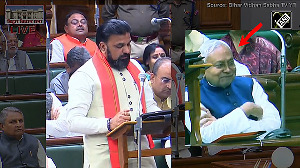Holding that a person can be charged under MCOCA even if no charge sheet has been filed against him in the past, the Bombay High Court has refused to discharge an alleged aide of gangster Guru Satam from trial. Stating that Govind Ubhe, the petitioner, "appears to be a member of the organised crime syndicate of Guru Satam", Division Bench of Justices Ranjana Desai and R G Ketkar refused to discharge him from trial, pending in MCOCA court.
Ubhe's lawyer Amit Desai had argued that until the present case, no charge sheet had been filed against his client in the past. Hence, Ubhe cannot be said to be part of the "continuing unlawful activity" of Satam gang as defined in MCOCA, he said. As per the Act, unlawful activity means "any activity prohibited by law, undertaken singly/jointly or on behalf of organised crime syndicate, and in respect of which more than one charge sheet has been filed in the last ten years."
Refuting the argument of Ubhey's lawyer, Justice Desai said in the judgment last week: "MCOCA essentially targets activities of organised crime syndicate. It is the membership of syndicate that makes the person liable under MCOCA." "Such a construction (as suggested by Ubhe's lawyer) would defeat the object to MCOCA," the judge said. "The words `more
Ubhe was arrested by Mumbai Crime Branch in December 2005 in an extortion case. The complainant (name not disclosed) had received a ransom call allegedly from Guru Satam, believed to be hiding out in South East Asia. The complainant, who was a cable TV operator, mentioned this in a meeting of cable operators in May 2005. Ubhe, who too is in the cable business, allegedly told the complainant that he knew Satam's relatives and he would have a talk with them on the issue.
Two days later, Ubhe took the complainant to meet Guru Satam's son Bhushan Satam and one Sachin Shetye. The amount of ransom was negotiated and was later handed over through Ubhe. After this, complainant received no threatening call. Ubhe was picked up by police later following the arrests of others involved in this transaction. He filed appeal in the High Court after a lower court refused to discharge him. Ubhe's argument was that he was only trying to help the complainant. But High Court held that prima facie he seemed to have known Satam's son "intimately" and he had taken "lead in negotiating the ransom amount". This indicated involvement in the crime, the court observed.






 © 2025
© 2025